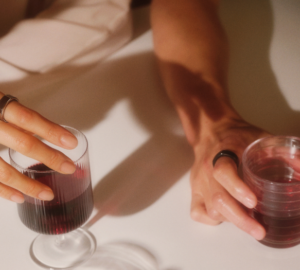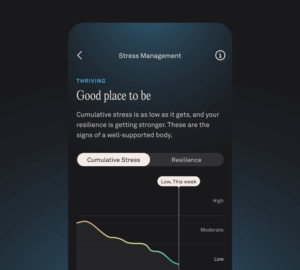Consider Elissa Epel, PhD the stress guru. A renowned psychologist and researcher at the University of California, San Francisco, with 30 years of experience studying stress, we’re thrilled to welcome her as a member of Oura’s medical advisory board.
Over the course of her esteemed career, Epel has studied stress and the effects of it on mental and metabolic health. She has published over 300 scientific papers and is the author of the New York Times bestseller, The Telomere Effect: A Revolutionary Approach to Living Younger, Healthier, Longer, and the newly released, The Stress Prescription.
Epel, who our science and product teams consulted with on the development of our new Daytime Stress feature, recently sat down with us to share more about her work. We also asked to share her words of wisdom for Oura members dealing with stress — in other words, all of us!
READ MORE: Track, Understand, and Manage Your Stress With Oura
What brought you to Oura?
I have been an Oura member for many years now and take great pleasure in seeing my data in the morning. Even when I get a bad night’s sleep, I find it interesting to see how my metrics are affected.
As a researcher, I’ve also used Oura as a tool in many studies. The ring itself is easy to wear, and the real-life data that it collects is extremely useful. We can use it to measure patterns in biomarkers over weeks or months.
As an example, in one study, we wanted to test the effects of different mind-body practices for three weeks in a group of people experiencing depression. We used Oura to track certain autonomic biomarkers (like heart rate, heart rate variability (HRV), and respiratory rate), and their sleep, to see whether these practices were beneficial.
What sparked your interest in stress?
I studied psychology and psychobiology at Stanford University and then did my doctorate at Yale in clinical and health psychology. I was initially interested in the relationship between stress and eating habits. I conducted an intervention study and discovered that stress can make you eat more — specifically more high-fat, high-sugar foods. This led me to think about how stress impacts our cells — not just via what we eat when we’re stressed, but how stress itself can impact our entire biology.
I’ve done 30 years of stress research, and I’m still just as interested in stress as ever. I don’t just study it, I live it! I am a naturally high-stress person, so all of the insights and practices I discover in my research, I use myself. One of my favorite parts of my work is learning about the ways to reduce stress, and the subsequent benefits for our mental, physical, and cellular health!
READ MORE: 9 Simple (and Science-Backed!) Ways to Lower Stress
What is the top misconception people have about stress?
That stress is all bad! Humans are built to handle stress. In fact, we need it. Stress can be tough to cope with sometimes, but we’d be a lot worse off without it. Stress prepares our mind and body for what we need to do, giving us a surge of energy and clarity, and the mental and physical resources we need to meet a challenge.
Stress is beneficial in the right dosage and frequency. These days, many people are experiencing chronic stress. This is partly due to triggers, like daily demands, deadlines, and to-do lists. But it’s also because we aren’t properly taught how to deal with stress.
You can never eliminate stress. Anything worth doing will have stress woven through it: challenge or discomfort reaps the biggest rewards. We can, however, change our response to stress.
LEARN MORE: Reframing Stress: The Difference Between “Bad” and “Good” Stress
How can stress impact our health?
It is critical to understand that stress effects are powerful, and that they are not just in our head. We can easily experience physiological stress even when we are going about our usual daily activities and not even be aware of it.
Too much chronic stress is damaging. There’s a litany of health ramifications, like sleep problems, increased risk of obesity, heart disease, diabetes, depression, and dementia. Stress gets into your cells, leading to elevated cortisol, oxidative stress, and inflammation. It also wears down your telomeres and damages your mitochondria, which accelerates aging.
However, exposure to minor, manageable stressors, like taking a cold shower, can actually impact you in a positive way! This type of stress, called hormetic stress, does the opposite of what chronic stress does: it improves your health at a cellular level.
LEARN MORE: How Stress Affects Your Sleep
What are some of the best ways to combat stress?
We all have different starting points “stress profiles” (which you can read more about in my book), which means we should follow different protocols.
However, across the board, here are three tips to manage that tend to be effective for many people:
1. Make time for “deep rest.”
Deep rest, or “Restored” on Oura, can be accessed during meditation, yoga, or qigong – your body is at its lowest level of psychological and physiological stress arousal so it’s very restorative.
2. Take frequent breaks.
It’s easy to get overloaded at work, and taking breaks can help to keep stress at bay. Beyond deep rest, you can also access a “green mind” state. This is your state of rest; it can occur while you’re passively engaged in leisure activities or when your attention is fully absorbed, sometimes called the “flow state.” Some examples of this state may include watching a movie, observing nature, or gardening.
3. Get comfortable with discomfort.
While it’s not an immediate stress reliever, changing how you view stress can have powerful outcomes. Aim to be flexible, open, and present in the face of stress. Know that it’s okay when things go awry. Life is uncertain, and getting comfortable with that makes you resilient.
RELATED: 6 Insights This Member Learned About His Stress With Oura











